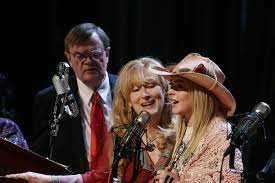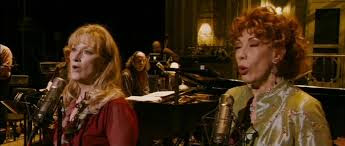Robert Altman (1925 – 2006) was one of America’s great filmmakers. Like many of his contemporaries, including Sydney Pollack, John Frankenheimer, and Sidney Lumet, he spent many of his early years as a director working in television – on series such as Alfred Hitchcock Presents, M Squad, Hawaiian Eye, Sugarfoot, Troubleshooters, Maverick, Bronco, U.S. Marshal, Combat, and even an episode of Peter Gunn, most of them the kind of TV I grew up on.
His first feature was The Delinquents (1957, currently streaming on Stan), although (with George W. George) he made The James Dean Story, a documentary, in the same year. It wasn’t until Countdown (1967) that he became a fully-fledged feature director. What followed was That Cold Day in the Park (1969) and then a string of equally impressive features, including three masterpieces in the 1970s – McCabe & Mrs. Miller (1971), The Long Goodbye (1973), and Nashville (1975) – as well as The Player (1992), the shortlived TV series, Tanner on Tanner (2004), and his final film, A Prairie Home Companion (2006), whose title is borrowed from the radio show which humourist Garrison Keillor hosted on Minnesota Public Radio for more than 30 years.
There’s a sense throughout that film, which is based on a screenplay by Keillor, of time moving on: the show is about to end, the station manager (Tommy Lee Jones) having decided that it has outlived its usefulness, that it’s time to pull the plug. “I feel like an anthropologist visiting a primitive tribe squatting around a fire somewhere in the forest,” he tells Kevin Kline’s security manager as Keillor and his company go about their very entertaining business.
Death is also lurking in the wings. A dark angel is on the move backstage. Played by Virginia Madsen as a femme fatale variation dressed all in white, she’s the best-looking Grim Reaper one is ever likely to encounter. But she’s an unwelcome visitor, about to enclose one of the older members of the cast in her lethal embrace.
I spoke to Altman shortly before his death at the age of 81 on November 20, 2006, around the time of the film’s Australian release. ACMI was running a season of his films to coincide with that and I was assigned the welcome task of introducing the season with a phone interview with him. He was clearly unwell at the time, but he soldiered on with grace and good humour.
***************************
 |
| Garrison Keillor, Meryl Streep, Lindsay Lohan A Prairie Home Companion |
Tom Ryan: Garrison Keillor says of your collaboration that you didn’t want to take a large part in the general development of the writing. That the casting would be the focus of your attention. Was this your perception of the process of preparing A Prairie Home Companion?
Robert Altman: In a way, yes. We were putting on a show and Garrison wrote this storyline that dealt with the characters. But, basically, my job was to put on that show.
Is this the kind of approach that you’ve always taken?
Pretty much, yes. I’ve probably had more input into the writing of my other films, but not much more. And, here, all the music was presented to me and I said fine. All the numbers were presented to me and I said fine. And we did it.
How did you go about assembling the cast?
I asked them and, if I got some enthusiasm, then we’d take it in that direction. I’m not sure in what order the cast came together.
 |
| Meryl Streep, Lily Tomlin A Prairie Home Companion |
What led you to put Meryl Streep and Lily Tomlin together?
Well, I knew that Meryl Streep loved to sing and I thought I could get her by saying, “You’ll get to sing a lot.” That worked and she did.
Why her rather than somebody else who’s better known for her singing?
I don’t know. I think that nothing could be more interesting than Meryl doing that part, singing the way she does.
Are there any kinds of actors that you don’t like working with?
Well, I don’t know. What do you mean, “What kind of actors?”? Actors who are rude, I don’t like working with. I don’t tolerate that very well, but I rarely run into that.
You seem to have worked with just about everybody: the big stars in Hollywood, the character actors. And they all seem to have been extremely happy to have worked with you.
Well, I’m pleased by that, but I don’t know how I can comment on it.
 |
| Kevin Kline, Maya Rudolph A Prairie Home Companion |
Do you have plans to work with Kevin Kline again?
Yes I do. Absolutely.
I’m pleased to hear that because when I saw the film I wondered to whom he was apologising when he fired a champagne cork off camera. I understand it was you who was hit?
It probably was.
And you left his apology in the film.
Well, sure. Because I liked it.
 |
| Keillor, Tomlin, Streep, Lohan |
What was it that appealed to you about A Prairie Home Companion?
My wife and I are big Keillor fans, so I was aware of him and loved his sense of humour. So when there was a suggestion that he wanted to make a picture and would I be interested in doing it with him, it was very attractive to me.
I understand though that he was actually pitching another screenplay to you rather than this one?
Well, yes. He has a radio series he does called Lake Wobegon, about a town and its people. I think he wanted to make a film of that, which would be a good idea. But as we got into it, I said, “Why don’t we just do your other radio show? This is what we’re talking about, doing research on all those things.” And that’s the way we decided to do it.
When you were looking for finance for the film, how did you pitch it?
Well, this one was put together pretty fast, pretty easy, and everybody seemed to come in at the same time. You know, it was very much “That’s a good idea, let’s do it”. And then we were doing it. I don’t even remember any particular angst during the period when I was worried about whether we’d get it made or not.
I understand there were some questions about insurance as well.
You mean on me?
Yeah.
Well, I can’t be insured because of my age. And so they insist on a stand-by director, somebody that would take over if I croaked.
And so it became Paul Thomas Anderson.
Yes. Stephen Frears did that for me on Gosford Park and Anderson did it for me on this picture. He was great. He was there all the time as a matter of fact.
Also his wife… partner… girlfriend… I don’t know… was pregnant and in the film. Maya Rudolph (above). So he had a double reason for being there.
Many books have been written about you, including Patrick McGilligan’s unauthorised biography in 1989, ‘Jumping Off the Cliff’. I know you’ve done numerous DVD commentaries, but have you ever considered writing your own memoirs to set the record straight?
Well, I don’t know what there is to be straight about. I know that book that McGilligan wrote was just atrocious. I don’t know what happened to him. He must have just sat down and got stoned and then went away and made it up because it was just… just silly.
Why not your own memoirs then?
Well, that’s hard work. But I’m thinkin’ I may do that. Not personal but just about the films.
Did you always want to be behind the camera, or was there a time when you had aspirations to be an actor?
Never, never an actor.
Well, there was that bit part in The Secret Life of Walter Mitty [1947].
There was. It’s true. I was an extra. And I got paid pretty good for that.
But that didn’t attract you to the profession in front of the camera?
Some people can do that and some people can’t. I can’t.
Tell me, when did the directing bug bite you?
I don’t know. I didn’t know I was bitten. Sounds like a mosquito. But I don’t know. I’ve always done the same thing.
I understand you used to write radio plays when you spent time overseas during WW2.
Yes, I did.
Was it around then that you got the idea that you might transform them into something different?
No, I was just in the mix with everybody else around that time who was aspiring to work in certain fields. I was very taken with radio. It really got me into the idea of drama. Norman Corwin was my idol. But radio had just become very artful, very good, when television came along and that was the end of it.
****************************
Editor's Note: This is the first part of an interview recorded by Tom Ryan with Robert Altman. Previous posts in this series can be found if you click on the names Hanif Kureishi & Roger Michell Ken Loach Pt 1 Ken Loach Pt2 Colin Firth (Part One) Colin Firth (Part Two) Lawrence Kasdan (Part One), Lawrence Kasdan (Part Two) Costa-Gavras Jonathan Demme (Part One) Jonathan Demme (Part Two) Click on the names to read the earlier pieces

No comments:
Post a Comment
Note: only a member of this blog may post a comment.